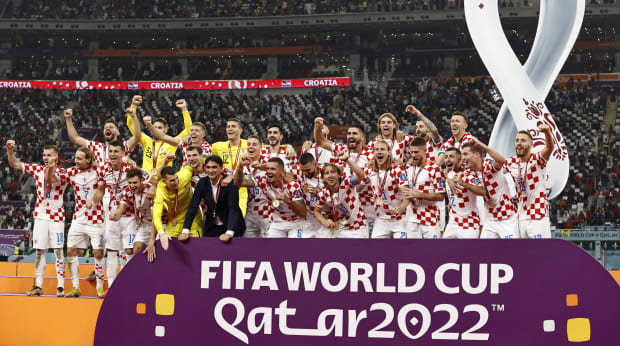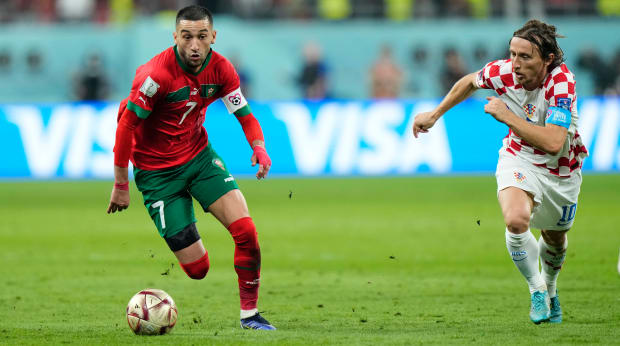The World Cup’s third-place match is often a meaningless affair between two strong, disappointed sides. Brazil was beaten on its own turf in this game in 2014 after the historic 7–1 embarrassment at the hands of Germany in the semifinal. England produced a mostly listless performance against Belgium in 2018 following an upset loss to Croatia.
Saturday’s match featured no such opponents, and it was no such match. Croatia beat surprise semifinalist Morocco 2–1 in a 90-minute battle that felt more like Sunday’s final than a futile friendly. It was the final showing between two nations that had no business reaching that point but absolutely deserved to be there.
Croatia, which had overcome deficits to beat Canada, Japan and Brazil before finally succumbing to Argentina, needed no such comeback this time. Breakout star defender Joško Gvardiol opened scoring in the seventh minute with a headed effort past Moroccan goalkeeper Yassine Bounou. It was the first time the Vatreni had led in a match since their 4–1 win over Canada in the group stage.
Morocco responded almost immediately. Its arial threat that seemed ever-present throughout the tournament broke through once again, as Achraf Dari headed home off an Atlas Lions set piece to equalize just two minutes after the opener.
With minutes left in the first half, Croatia pounced on a chance to counterpress, winning the ball back high up the pitch before Mislav Orsić curled a shot right around the outstretched hand of Bounou, off the post and in for the eventual winner.

Maurice van Steen/IMAGO
For both, it was a performance that was emblematic of their tournaments as a whole. Croatia accepted pressure at times, absorbed it and took advantage of its chances. Morocco was brave: It out-created the Vatreni 1.19 expected goals to 0.66. It produced several excellent chances to draw level but it didn’t quite have the finishing touch.
“You can’t win a World Cup with miracles,” Morocco manager Walid Regragui said after the semifinal loss to France.
A miracle is what it seemed like it would’ve taken for the Atlas Lions entering Qatar. Morocco plucked Regragui from Casablanca-based club Wydad on Aug. 31—less than three months before the team left for Qatar. Chelsea winger Hakim Ziyech, having fallen out with former Morocco manager Vahid Halilhodžić, rejoined the team just before the tournament.
It may have been a team of moving parts, but it was not a team of spare parts. Morocco lacked the stable of big names that fill up the rosters of some of Europe and South America’s biggest nations, but it lacked little in talent. This was simply a stage to display just how far it’s come from after going 20 years without a World Cup appearance between 1998 and 2018.
Midfielders Sofyan Amrabat and Azzedine Ounahi have been two of the breakout stars of the tournament. Morocco went toe-to-toe with the likes of Belgium, Spain and Portugal and didn’t just hold its own, but dominated in a way that few African teams have done on this stage before. Bounou’s lockdown on the goal eventually broke in the semifinal and then again in the third-place game, but he, too, looked like one of the best in the world at his position. Ziyech was revitalized, freed from the bench with Chelsea and the doghouse with Halilhodžić. Morocco didn’t show it may one day contend with the giants. It was 90 minutes away from playing in a World Cup final. It has already arrived as a team both tactically astute and technically gifted enough to play greater than the sum of its parts. Becoming the first African team to reach a World Cup semifinal was the crowing achievement, and it was no fluke.

Jose Breton/IMAGO
The story of Saturday’s winner may be even more astounding. A nation of under four million followed up a second-place finish at the 2018 World Cup with a bronze in 2022. That alone is the stuff of legend. How it did it is just as impressive.
A midfield three with an average age of 32 played all but 19 minutes (plus stoppage time) in the group stage, then ran the show for 120 minutes against Japan and was instrumental for 120 more against Brazil. Luka Modrić has spent his whole life defying odds, and has spent the last decade as one of the best midfielders in the world at Real Madrid. He now can add another notch to his belt as an unlikely hero.
The Vatreni, too, have their own breakout stars. Gvardiol, save for his “welcome to the league” moment against Lionel Messi in the semifinal, was probably the best central defender in Qatar. Josip Juranović could make a similar case at right back. But the road to the semifinals was bumpy. An opening-match draw with Morocco meant Croatia had to gut out a draw with Belgium in the final group-stage game just to reach the round of 16. It then went down 1–0 to Japan and did the same vs. Brazil before grinding out penalty shootout victories against both. It was by no accident that both matches went the distance. Croatia played to its strengths, controlling the tempo and rarely getting stretched defensively until a few key moments in the semifinal loss to Argentina.
“Maybe it wasn’t expected that Croatia would do something big again, but we are a small country with big dreams,” manager Zlatko Dalić told BeIN SPORTS.
Those dreams have been powered by the 5’8”, 246-pound Modrić for more than a decade. The diminutive maestro has now orchestrated his final World Cup masterpiece with his national team. His legacy with club and country are now set in stone: The only teams to finish in the top three in consecutive men’s World Cups are Brazil, Netherlands, Germany, France, Italy, Argentina and now Croatia.
As it always is, this has been a World Cup defined by its moments. Sunday’s final promises to add one or two more to the scrapbook. But these two teams have etched their names into the lore of this sport. Maybe it marks the dawn of new era, in which international soccer’s riches don’t always fall to one of a handful of giants. Even if it doesn't, these remarkable runs will still live on as soccer’s Davids overcoming some of the sport’s Goliaths.
“Football makes people dream, especially children,” Regragui said after Saturday’s match. “We allowed them to dream, kept the dream alive and now they dream of being footballers and getting to the World Cup. That is priceless. It means more than winning any match.”







